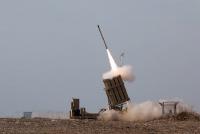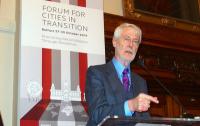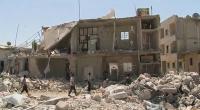-
Saudi Arabia leads effort to create a Muslim NATO-like alliance
Saudi Arabia has approached thirty-four Muslim-majority countries with a proposal to create a NATO-like military alliance of Islamic countries to combat terrorism. The proposed alliance would not be formed to confront any country in particular, but rather would be put together for the purpose of combatting terrorism. It is unclear whether Iran will be invited to join the new alliance.
-
-
Aussie stationery chain pulls world globe which names Palestine, omits Israel
The Australian stationery chain Typo has stumbled into one of the world’s most contentious issues – and had to pull a line of globes which named Palestine but omitted the label “Israel.” Israel’s name was not omitted altogether: The globe was designed so that Israel and twelve other small countries were represented by a number on the map, corresponding to a number in a legend at the base of the globe. The globe sparked charges of anti-Semitism, but the company’s decision to halt production of the globes has led to boycott threats by Palestine advocates.
-
-
Canada’s intelligence agency halts intelligence sharing with international partners
Canada’s Communications Security Establishment (CSE), the country electronic signals intelligence agency, said it has stopped sharing intelligence with several close international partners after disclosing it had illegally collected the communication metadata of Canadian citizens in the process of eavesdropping on foreign communications. In a report to parliament last Thursday, CSE said the breach was unintentional, and that it had been discovered internally in 2013.
-
-
Adelson offered to pay for Iron Dome’s development

In 2013, shortly after Congress had passed a funding bill for the joint Pentagon-Israel Iron Dome missile defense system, Senator Harry Reid (D-Nevada), then the Senate’s majority leader, received a call from one of his constituents, the gambling billionaire Sheldon Adelson. Adelson asked Reid to convey to the White House a most unusual offer: He, Adelson, was willing personally to contribute $1 billion of his own money toward the development costs of Iron Dome.
-
-
It’s too late for a two-state solution in Israel-Palestine

Many obstacles stand in the way of a two-state solution to the conflict in Israel and Palestine. The current wave of violence has cemented additional layers of distrust of Palestinians to the ones Jewish Israelis already harbor. The hatred is calcifying. Reaching a two-state solution is essential: Within a few years there will be more Palestinians than Jews “between the River and the Sea,” and without a Palestinian state, Israel will either have to give the right to vote to Palestinians or become an apartheid state like South Africa once was. Demographic changes taking place within Israel’s Jewish population, however, may make the implementation of a two-state solution, if it is miraculously agreed to by the two sides, impossible to implement. The most important structural change is that Israel is steadily becoming more religious, which is leading to a decline in the overall level of education and economic productivity of the Israeli population. Allied to the increasing propensity to religiosity among Israeli Jews are trends in the composition of the Israel Defense Forces (IDF), a change that raises questions about the reliability of the army. The IDF is increasingly a religious army, recruited from the settler community in the West Bank. Best estimates are that if a two-state agreement is somehow reached, about 100,000 settlers would have to be evacuated from the West Bank under any such agreement. Could the IDF be relied upon to evacuate Jerusalem and West Bank settlements — as they did in Gaza in 2005 — with battalion commanders who are increasingly religious, and with religious soldiers who, in any event, are more likely to obey their rabbis’ instructions than their commanders’ orders? With every passing year, using the IDF to evacuate settlers from the West Bank will become more problematic, and evacuation less likely — which means that reaching, and implementing, a two-state solution is becoming less likely as well.
-
-
Could an end to Syria’s civil war be in sight?

None of the previous attempts to resolve the conflict among the warring parties in Syria through negotiations, such as the Geneva II talks in the beginning of 2014, has had a happy ending. And, in retrospect most observers would go so far as to say that they were doomed to failure. But if, until now, there was zero chance for all principals, both external and internal, to work out a settlement, there currently exists a slender — a very slender — chance for success. A word of caution: Just because most of the parameters are in place does not mean an agreement will be reached. The “Clinton Parameters” — so-called because they were put forward in a last-ditch attempt at a solution by Bill Clinton in 2000, the last year of his presidency — are widely acknowledged to be the basis for any Israeli-Palestinian peace. They have been on the table for a decade and a half, and a resolution to that conflict is nowhere in sight.
-
-
Merkel: Germany will “drastically reduce” number of refugees arriving in Germany

German chancellor Angela Merkel said Sunday that she wanted to “drastically decrease” the number of refugees coming to Germany, indicating she would willing to compromise with critics within her own conservative party, the Christian Democratic Union (CDU). These critics have charged that her open-door policy posed security risks to Germany and would expand the government welfare rolls.
-
-
French backlash, Egypt: no terrorism in plane crash, Libyan unity government

The French right-wing Front National failed to translate its gains in the first round of France’s regional elections a week ago into any victories in the election’s second round on Sunday; Angela Merkel, facing growing opposition from within her party to her open-door refugee policy, said she would limit number of refugees arriving in German; Turkish prime minister Erdogan says the Middle East “would benefit greatly from normalization of Turkish-Israeli relations; the two rival Libyan governments are set to sigh a historic peace accord in Morocco on Wednesday.
-
-
Ruling shows Europe still vexed over NSA spying, leaving U.S. companies in legal limbo
For over fifteen years, the Data Transfer Pact between the European Union and the United States, more commonly known as Safe Harbor, had ensured that companies with EU operations could transfer online data about their employees and customers back to the United States despite stark differences between U.S. and European privacy law. Earlier this month, U.S. companies operating in Europe got some unwelcome news: Safe Harbor had been ruled invalid. The European court’s ruling has serious implications for these companies’ business models and profitability, leaving many scrambling to find solutions. But it also exposes a fundamental cultural rift between the U.S. and Europe’s conceptions of privacy – one that a new agreement won’t be able to paper over.
-
-
U.S. should lead climate change fight to bolster global stability: U.S. defense, diplomacy leaders
Forty-eight former U.S. leaders, both Republicans and Democrats – among them secretaries of state and defense, national security advisers, leaders of the intelligence community, diplomats, generals in all four branches of the armed services, senators, and members of the House of Representatives – have published an open letter in the Wall Street Journal which called on U.S. political and business leaders to “think past tomorrow” and lead the fight on climate change. The U.S. security establishment has long recognized the threat posed by climate change to U.S. national security, defining climate change as a “threat multiplier,” adding fuel to conflicts. Security experts and military leaders no longer regard climate change as only a threat multiplier, but rather as s serious danger on its own – with droughts, sea-level rise, food shortages, and extreme weather events triggering migration and armed conflicts.
-
-
Russia will soon begin to pay a steep price for Syrian campaign: Ash Carter
Moscow will soon begin to pay a steep price – in the form of reprisal attacks and casualties — for its escalating military intervention on behalf of the Assad regime in Syria, U.S. Defense Secretary Ashton Carter has warned. Earlier this week, fifty-five leading Muslim clerics, including prominent Islamists, urged “true Muslims” to “give all moral, material, political and military” support to the fight against Assad’s army as well as Iranian and Russian forces. “Russia has created a Frankenstein in the region which it will not be able to control,” warned a senior Qatari diplomat. “With the call to jihad things will change. Everyone will go to fight. Even Muslims who sit in bars. There are 1.5 billion Muslims. Imagine what will happen if 1 percent of them join.”
-
-
Iran not invited to a UN summit on ISIS because U.S. designates it as a state sponsor of terrorism
The United States did not invite Iran to Tuesday’s UN summit on combating Islamic State and other violent extremist groups because the Department of State still designates Iran as a state sponsor of terrorism. It is not likely that Iranian president Hassan Rouhani would have participated in the summit even if Iran were invited. Observers note that the fact that Iran has not been invited to a meeting to discuss a coordinated strategy to defeat ISIS, a Sunni militant group Iran regards as an enemy, is yet one more illustration of the institutional and political obstacles to U.S. cooperation with Iran beyond the nuclear deal the two sides agreed to in July.
-
-
Morocco blocks opening of Ikea store after Sweden announces support for breakaway Western Sahara republic

Ikea was scheduled to open its first store in Morocco today, but the Moroccan government has blocked the opening because the store lacked a “conformity permit,” a statement from the Interior Ministry said yesterday. Earlier on Monday, a news Web site close to the Moroccan palace said the store was not allowed to open because of Sweden’s plans to recognize an independent state – to be called Sahrawi Republic — championed by the Polisario Front in the Western Sahara. Morocco claims sovereignty over the Western Sahara.
-
-
Subjecting countries to “targeted punishments” could tackle climate change
Targeted punishments could provide a path to international climate change cooperation, new research in game theory has found. The research suggests that in situations such as climate change, in which everyone would be better off if everyone cooperated but it may not be individually advantageous to do so, the use of a strategy called “targeted punishment” could help shift society toward global cooperation.
-
-
Israelis to gain $120 billion, Palestinians $50 billion over next decade in two-state solution
The Israeli economy stands to gain more than $120 billion over the next decade in a two-state solution, a possible resolution of the long-standing conflict between Israelis and Palestinians in which the Palestinians gain independence and relations between the Israelis and their neighbors normalize, according to a new RAND Corporation study. Palestinians would gain $50 billion, with average per-capita income rising by about 36 percent. A return to violence, by contrast, would have profoundly negative economic consequences for both Palestinians and Israelis. The estimates are part of a systematic effort to quantify the likely economic and security costs and benefits of five alternative futures for the conflict relative to present trends. Besides the two-state and return-to-violence scenarios, RAND researchers considered three additional alternative futures: a coordinated unilateral withdrawal from the West Bank by Israel, uncoordinated withdrawal where Palestinians do not cooperate with Israeli unilateral moves, and nonviolent resistance by Palestinians.
-
More headlines
The long view
No Nation Is an Island: The Dangers of Modern U.S. Isolationism
The resurgence of isolationist sentiment in American politics is understandable but misguided. While the desire to refocus on domestic renewal is justified, retreating from the world will not bring the security, prosperity, or sovereignty that its proponents promise. On the contrary, it invites instability, diminishes U.S. influence, and erodes the democratic order the U.S. helped forge.
Fragmented by Design: USAID’s Dismantling and the Future of American Foreign Aid
The Trump administration launched an aggressive restructuring of U.S. foreign aid, effectively dismantling the United States Agency for International Development (USAID). The humanitarian and geopolitical fallout of the demise of USAID includes shuttered clinics, destroyed food aid, and China’s growing influence in the global south. This new era of American soft power will determine how, and whether, the U.S. continues to lead in global development.
Water Wars: A Historic Agreement Between Mexico and US Is Ramping Up Border Tension
As climate change drives rising temperatures and changes in rainfall, Mexico and the US are in the middle of a conflict over water, putting an additional strain on their relationship. Partly due to constant droughts, Mexico has struggled to maintain its water deliveries for much of the last 25 years, deliveries to which it is obligated by a 1944 water-sharing agreement between the two countries.
How Disastrous Was the Trump-Putin Meeting?
In Alaska, Trump got played by Putin. Therefore, Steven Pifer writes, the European leaders and Zelensky have to “diplomatically offer suggestions to walk Trump back from a position that he does not appear to understand would be bad for Ukraine, bad for Europe, and bad for American interests. And they have to do so without setting off an explosion that could disrupt U.S.-Ukrainian and U.S.-European relations—all to the delight of Putin and the Kremlin.”
